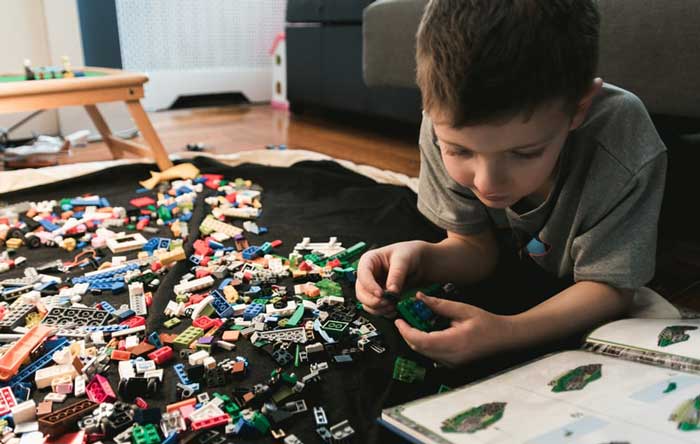What Makes a Kid Lazy?
“My kid is lazy”, it is a thought that often occurs to parents – many times a day they wonder why their child displays laziness, gross laziness, in their opinion. They think children should be different. That’s right, as a rule, children are not lazy – so when one behaves languidly, it may be due to a number of physical and/or psychological conditions. So if you mean to address the issue you will have to detect the cause that is at work on any given occasion.
Difficulty with learning
The child may have developed a learning disability without even realizing it and is now laboring under the burden – that naturally makes them unwilling and “lazy.”
When their difficulties grow too big for them, no wonder kids lose interest and motivation. If teachers and parents fail to understand their concerns they begin to brand them as lazybones.
Being overwhelmed or disoriented
We all encounter overwhelming situations no matter how grown up we are. We know how to cope with one: separate the issue into fragments and tackle every single fragment one after another. Children are too young to understand this technique.
Therefore, seeing that your kid is struggling with such a predicament, you have to take him or her through the situation.
- What exactly overwhelms them?
- What is the starting point to handle the issue?
- What solutions can there be? Which is the best one?
Asking these pointed questions helps you and your kid get oriented in the issue, think it over calmly, and have a go at cracking it. Discussing it together you show them that they have your support and assistance.
When, for some reason or other, the child gets discouraged, it is also an overwhelming situation for them. They need to be taught that failure is unavoidable and necessary for learning. When they fail, it doesn’t mean that you are no longer proud of them. Keep supplying encouragement as often as you can to ensure the kid stays motivated.
Attention-deficit problems (ADHD, ADD)
ADHD and ADD are common neurodevelopmental issues that cause concentration problems in children. If they are not addressed in good time, affected children develop impaired learning ability and are no longer motivated to study.
ADHD comes in three variations:
- Prevailing hyperactive-impulsive type
- Prevailing inattentive type
- Both types combined
All of these three types are characterized by poor concentration, but those children who are only inattentive will not display any kind of behavior that could serve as justification for a diagnosis. Since they are hard to diagnose, such kids are often looked upon as merely lazy.
In addition, children can have ADHD symptoms without meeting the criteria for a diagnosis. All these may be reasons why a child appears unmotivated and lazy. What’s more, some ADHD kids fail to display distinct enough symptoms to be properly diagnosed. They also end up as being branded lazy.
Parents bent on heavy control
Coming after biological needs, what children need most to sustain motivation is a degree of autonomy. They need to know they have control over whatever they are supposed to do. Ideally, kids should learn and make headway without being pressurized or coerced. It means they understand and embrace the value of academic knowledge and are going strong in motivating themselves.
Yet if parents hand out control that is too heavy and stifling, they diminish the kids’ motivation and can finally demoralize them. Little wonder, then, that they feel dispirited and seem to be lazy.
You and your kid are engaged in an unceasing power struggle
When a parent embarks on pitting his or her will against that of the child, it turns into a battle that never ends. The aim of the process is to gain supremacy – so when kids feel they can make you angry, they will avail themselves of the opportunity. If you press on them to improve their grades in a subject they will turn a deaf ear to it just to win around.
It is advisable to put forward choices rather than bark out orders – with kids it works better even if you are not engaged in a tug-of-war.
Anxiety conditions
Pre-teens and teens often struggle with strong anxiety, even if the condition is not grave enough to be diagnosed. It is not normal for anxious children to have high motivation. It goes for all kinds of anxiety, but they can suffer from academic anxiety which is especially bad for learning motivation.
Insufficient sleep
When a kid is sleepy it will definitely look as if they were lazy, unwilling and even recalcitrant. Having spent a sleepless night, children grow tired very quickly, their motivation fails to kick in, and their memories are impaired, too. Lack of sleep or bad sleep will certainly tell on their activity at school as well as on their progress.
If they get to sleep late because they are distracted by gadgets, the exposure to the blue light that is emitted from the screen can also worsen the quality of their sleep.
Depressive bouts
Adolescents prone to depression are not very good at activities due to the dearth of energy and low motivation. Besides, depression can be aggravated by sleeplessness – 90% of depressive people also have trouble sleeping. When gotten down by depression, the child cannot brace himself to get engaged in an activity or doing homework.
Perfectionism against failure
A perfectionist child can be easily marked out by attempts to please, proclivity to procrastination, and anxiety to do everything as well as it can be done (or better). These perfectionist tendencies can actually be very debilitating. The inability to attain perfection and the possibility of failure are apt to cause a lot of strain and fearfulness.
Some of the things that parents dish out to their kids can be aggravating if the child is inclined to be perfect. Every reproach will be taken as an incentive to be yet more perfect and avoid mistakes at all costs. On the contrary, children need to know that mistakes are a necessary part of gaining experience and go to mark their progress.
Understanding incompetence
Even adults can’t stump up enough motivation for an activity they know they won’t be able to do well enough. Children cannot be expected to fare better when they realize they lack skills or knowledge to distinguish themselves in a certain school subject.
The influence of stress
As stress mounts up, the brain goes low on the dopamine level – and this leaves us demotivated, hitting the young more than adults. Stress can develop as a result of manifold reasons, like the death of a relative, a violent falling-out with pals, moving out of home into new surroundings.
The child lives with the feeling that he or she is the source of problems for his family
So your kids go along with no visible motivation and are looked upon as hangers-on. Naturally, you are less than happy with the situation. Consequently, you can grow a habit of regarding them as a problem. The more you do so, the less chance there is of their positive response.
You should accentuate that they are individuals and they are important nonetheless. Rather than keep at them for their shortcomings, get them into a conversation about their favorite activities. Show them that they have your interest and support even if they are not currently measuring up to your idea of their level of performance.





